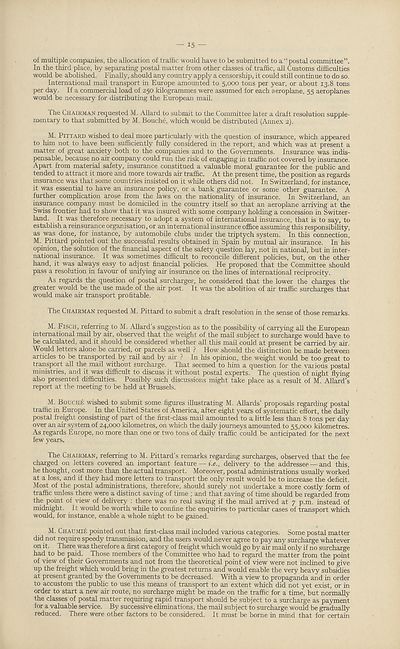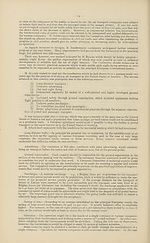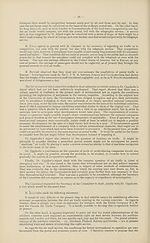Communications and transit > Air transport co-operation committee : minutes of the first session : held at Geneva from July 8th to 12th, 1930
(15)
Download files
Complete book:
Individual page:
Thumbnail gallery: Grid view | List view

15 —
of multiple companies, the allocation of traffic would have to be submitted to a “postal committee”.
In the third place, by separating postal matter from other classes of traffic, all Customs difficulties
would be abolished. Finally, should any country apply a censorship, it could still continue to do so.
International mail transport in Europe amounted to 5,000 tons per year, or about 13.8 tons
per day. If a commercial load of 250 kilogrammes were assumed for each aeroplane, 55 aeroplanes
would be necessary for distributing the European mail.
Ihe Chairman requested M. Allard to submit to the Committee later a draft resolution supple¬
mentary to that submitted by M. Bouche, which would be distributed (Annex 2).
M. Pittard wished to deal more particularly with the question of insurance, which appeared
to him not to have been sufficiently fully considered in the report, and which was at present a
matter of great anxiety both to the companies and to the Governments. Insurance was indis¬
pensable, because no air company could run the risk of engaging in traffic not covered by insurance.
Apart from material safety, insurance constitued a valuable moral guarantee for the'public and
tended to attract it more and more towards air traffic. At the present time, the position as regards
insurance was that some countries insisted on it while others did not. In Switzerland, for instance,
it was essential to have an insurance policy, or a bank guarantee or some other guarantee. A
further complication arose from the laws on the nationality of insurance. In Switzerland, an
insurance company must be domiciled in the country itself so that an aeroplane arriving at the
Swiss frontier had to show that it was insured with some company holding a concession in Switzer¬
land. It was therefore necessary to adopt a system of international insurance, that is to say, to
establish a reinsurance organisation, or an international insurance office assuming this responsibility,
as was done, for instance, by automobile clubs under the triptych system. In this connection,
M. Pittard pointed out the successful results obtained in Spain by mutual air insurance. In his
opinion, the solution of the financial aspect of the safety question lay, not in national, but in inter¬
national insurance. It was sometimes difficult to reconcile different policies, but, on the other
hand, it was always easy to adjust financial policies. He proposed that the Committee should
pass a resolution in favour of unifying air insurance on the lines of international reciprocity.
As regards the question of postal surcharges, he considered that the lower the charges the
greater would be the use made of the air post. It was the abolition of air traffic surcharges that
would make air transport profitable.
Ihe Chairman requested M. Pittard to submit a draft resolution in the sense of those remarks.
M. Fisch, referring to M. Allard’s suggestion as to the possibility of carrying all the European
international mail by air, observed that the weight of the mail subject to surcharge would have to
be calculated, and it should be considered whether all this mail could at present be carried by air.
Would letters alone be carried, or parcels as well ? How should the distinction be made between
articles to be transported by rail and by air ? In his opinion, the weight would be too great to
transport all the mail without surcharge. I hat seemed to him a question for the various postal
ministries, and it was difficult to discuss it without postal experts. The question of night flying
also presented difficulties. Possibly such discussions might take place as a result of M. Allard’s
report at the meeting to be held at Brussels.
M. Bouche wished to submit some figures illustrating M. Allards’ proposals regarding postal
traffic in Europe. In the United States of America, after eight years of systematic effort, the daily
postal freight consisting of part of the first-class mail amounted to a little less than 8 tons per day
over an air system of 24,000 kilometres, on which the daily journeys amounted to 55,000 kilometres.
As regards Europe, no more than one or two tons of daily traffic could be anticipated for the next
few years.
The Chairman, referring to M. Pittard’s remarks regarding surcharges, observed that the fee
charged on letters covered an important feature — i.e., delivery to the addressee — and this,
he thought, cost more than the actual transport. Moreover, postal administrations usually worked
at a loss, and if they had more letters to transport the only result would be to increase the deficit.
Most of the postal administrations, therefore, should surely not undertake a more costly form of
traffic unless there were a distinct saving of time ; and that saving of time should be regarded from
the point of view of delivery : there was no real saving if the mail arrived at 7 p.m. instead of
midnight. It would be worth while to confine the enquiries to particular cases of transport which
would, for instance, enable a whole night to be gained.
M. Chaumie pointed out that first-class mail included various categories. Some postal matter
did not require speedy transmission, and the users would never agree to pay any surcharge whatever
on it. There was therefore a first category of freight which would go by air mail only if no surcharge
had to be paid. Those members of the Committee who had to regard the matter from the point
of view of their Governments and not from the theoretical point of view were not inclined to give
up the freight which would bring in the greatest returns and would enable the very heavy subsidies
at present granted by the Governments to be decreased. With a view to propaganda and in order
to accustom the public to use this means of transport to an extent which did not yet exist, or in
order to start a new air route, no surcharge might be made on the traffic for a time, but normally
the classes of postal matter requiring rapid transport should be subject to a surcharge as payment
for a valuable service. By successive eliminations, the mail subj ect to surcharge would be gradually
reduced. There were other factors to be considered. It must be borne in mind that for certain
of multiple companies, the allocation of traffic would have to be submitted to a “postal committee”.
In the third place, by separating postal matter from other classes of traffic, all Customs difficulties
would be abolished. Finally, should any country apply a censorship, it could still continue to do so.
International mail transport in Europe amounted to 5,000 tons per year, or about 13.8 tons
per day. If a commercial load of 250 kilogrammes were assumed for each aeroplane, 55 aeroplanes
would be necessary for distributing the European mail.
Ihe Chairman requested M. Allard to submit to the Committee later a draft resolution supple¬
mentary to that submitted by M. Bouche, which would be distributed (Annex 2).
M. Pittard wished to deal more particularly with the question of insurance, which appeared
to him not to have been sufficiently fully considered in the report, and which was at present a
matter of great anxiety both to the companies and to the Governments. Insurance was indis¬
pensable, because no air company could run the risk of engaging in traffic not covered by insurance.
Apart from material safety, insurance constitued a valuable moral guarantee for the'public and
tended to attract it more and more towards air traffic. At the present time, the position as regards
insurance was that some countries insisted on it while others did not. In Switzerland, for instance,
it was essential to have an insurance policy, or a bank guarantee or some other guarantee. A
further complication arose from the laws on the nationality of insurance. In Switzerland, an
insurance company must be domiciled in the country itself so that an aeroplane arriving at the
Swiss frontier had to show that it was insured with some company holding a concession in Switzer¬
land. It was therefore necessary to adopt a system of international insurance, that is to say, to
establish a reinsurance organisation, or an international insurance office assuming this responsibility,
as was done, for instance, by automobile clubs under the triptych system. In this connection,
M. Pittard pointed out the successful results obtained in Spain by mutual air insurance. In his
opinion, the solution of the financial aspect of the safety question lay, not in national, but in inter¬
national insurance. It was sometimes difficult to reconcile different policies, but, on the other
hand, it was always easy to adjust financial policies. He proposed that the Committee should
pass a resolution in favour of unifying air insurance on the lines of international reciprocity.
As regards the question of postal surcharges, he considered that the lower the charges the
greater would be the use made of the air post. It was the abolition of air traffic surcharges that
would make air transport profitable.
Ihe Chairman requested M. Pittard to submit a draft resolution in the sense of those remarks.
M. Fisch, referring to M. Allard’s suggestion as to the possibility of carrying all the European
international mail by air, observed that the weight of the mail subject to surcharge would have to
be calculated, and it should be considered whether all this mail could at present be carried by air.
Would letters alone be carried, or parcels as well ? How should the distinction be made between
articles to be transported by rail and by air ? In his opinion, the weight would be too great to
transport all the mail without surcharge. I hat seemed to him a question for the various postal
ministries, and it was difficult to discuss it without postal experts. The question of night flying
also presented difficulties. Possibly such discussions might take place as a result of M. Allard’s
report at the meeting to be held at Brussels.
M. Bouche wished to submit some figures illustrating M. Allards’ proposals regarding postal
traffic in Europe. In the United States of America, after eight years of systematic effort, the daily
postal freight consisting of part of the first-class mail amounted to a little less than 8 tons per day
over an air system of 24,000 kilometres, on which the daily journeys amounted to 55,000 kilometres.
As regards Europe, no more than one or two tons of daily traffic could be anticipated for the next
few years.
The Chairman, referring to M. Pittard’s remarks regarding surcharges, observed that the fee
charged on letters covered an important feature — i.e., delivery to the addressee — and this,
he thought, cost more than the actual transport. Moreover, postal administrations usually worked
at a loss, and if they had more letters to transport the only result would be to increase the deficit.
Most of the postal administrations, therefore, should surely not undertake a more costly form of
traffic unless there were a distinct saving of time ; and that saving of time should be regarded from
the point of view of delivery : there was no real saving if the mail arrived at 7 p.m. instead of
midnight. It would be worth while to confine the enquiries to particular cases of transport which
would, for instance, enable a whole night to be gained.
M. Chaumie pointed out that first-class mail included various categories. Some postal matter
did not require speedy transmission, and the users would never agree to pay any surcharge whatever
on it. There was therefore a first category of freight which would go by air mail only if no surcharge
had to be paid. Those members of the Committee who had to regard the matter from the point
of view of their Governments and not from the theoretical point of view were not inclined to give
up the freight which would bring in the greatest returns and would enable the very heavy subsidies
at present granted by the Governments to be decreased. With a view to propaganda and in order
to accustom the public to use this means of transport to an extent which did not yet exist, or in
order to start a new air route, no surcharge might be made on the traffic for a time, but normally
the classes of postal matter requiring rapid transport should be subject to a surcharge as payment
for a valuable service. By successive eliminations, the mail subj ect to surcharge would be gradually
reduced. There were other factors to be considered. It must be borne in mind that for certain
Set display mode to:
![]() Universal Viewer |
Universal Viewer | ![]() Mirador |
Large image | Transcription
Mirador |
Large image | Transcription
Images and transcriptions on this page, including medium image downloads, may be used under the Creative Commons Attribution 4.0 International Licence unless otherwise stated. ![]()
| League of Nations > Communications and transit > Air transport co-operation committee : minutes of the first session : held at Geneva from July 8th to 12th, 1930 > (15) |
|---|
| Permanent URL | https://digital.nls.uk/194043542 |
|---|
| Shelfmark | LN.VIII |
|---|
| Description | Over 1,200 documents from the non-political organs of the League of Nations that dealt with health, disarmament, economic and financial matters for the duration of the League (1919-1945). Also online are statistical bulletins, essential facts, and an overview of the League by the first Secretary General, Sir Eric Drummond. These items are part of the Official Publications collection at the National Library of Scotland. |
|---|---|
| Additional NLS resources: |
|

